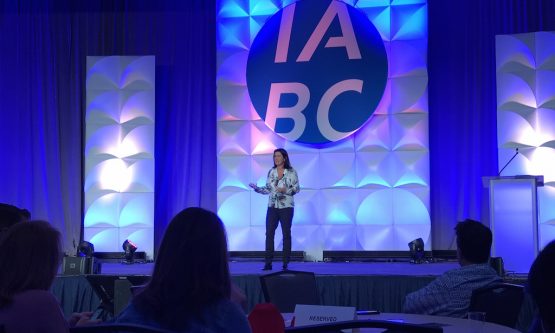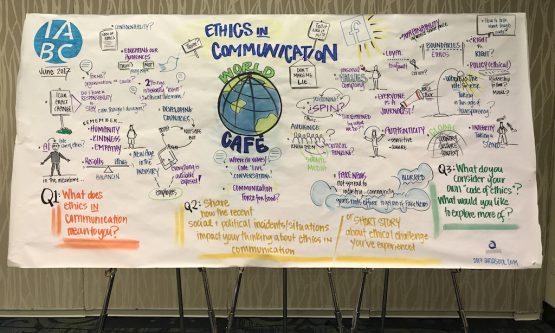By Susan Hoffman
Contributor
Earlier this week, the International Association of Business Communicators (IABC) held its 2017 World Conference at the Connecticut Avenue Hilton Hotel in Washington, DC. Attendees included business communicators from all over the world, including Mexico, Canada, Ireland, Britain, Scotland, Barbados, India, China, Kenya, Denmark, Australia and the United States.
The conference provided the opportunities to listen and learn from various speakers with wide-ranging expertise in multiple fields. These speakers offered valuable lessons in both internal and external business communication.
Keynote Speaker Says: Lose the Business Jargon and Tell Authentic, Memorable Stories
In her keynote speech, “Authentic Leadership and Storytelling,” Australian storytelling expert and author Gabrielle Dolan spoke of the need to use simpler language in business. She noted that everyone in a business – from the CEO to the building custodians – should be able to clearly understand external or internal communications. Otherwise, productivity is impaired and customers are lost.
Dolan also had the audience perform an exercise in communication. The audience divided into groups of two or three people and each person used their fingers to tap out a song. Others at the same table had to guess the song, which proved difficult despite the use of well-known songs such as “Jingle Bells” and “Happy Birthday.”
The point of the exercise was to indicate that we overestimate how people receive our communication. She stated that even though you thoroughly know your business, you need the right way to communicate your stories, so that your audience understands and remembers them.

Dolan emphasized the need for authentic leadership and the power of memorable stories in business. She encouraged IABC attendees to ensure that they and their leadership avoid the use of hard-to-understand terms such as “executional excellence” and use simplified language that promotes a human relationship.
She also discussed the power of a memorable story. By telling a memorable personal story to illustrate a business point, you make an emotional connection with your audience. Customers will then understand, remember and retell your story.
World Café Provides Group Opportunity to Discuss Ethics in Communication
During an event called “World Café,” IABC attendees discussed ethics in communication. Each table had a large sheet of paper and attendees jotted down ideas on sticky notes about what ethics meant to them. Later, these thoughts on ethical communication were condensed into an oversize poster.

Two IABC Workshops Discuss International Business Communication
Although the majority of the speeches dealt with common problems shared by communicators worldwide, some speakers paid particular attention to communication involving other cultures. One of the workshops offered was “How culture influences brand communication: An African perspective” and another was “Communicating across the language barrier: Making your message count.”
Another Speaker Offers Lessons on Communication Excellence
In his presentation, “The Art of Business Influence,” British-American speaker and strategic communications expert Mark Jeffries noted that everyone is capable of becoming better as business communicators. He gave a simple formula (L-WAR) for excellence in verbal business communication:
Listen: Become an active listener and pay attention to what people are saying (or NOT saying).
Watch: Observe the body language of people listening to you. Target your communications to them and adjust what you say if necessary.
Anticipate: Put yourself in your audience’s shoes. Consider their problems and how your solutions can solve those problems.
React: React to what people are saying and doing as you’re trying to influence the outcome of your meeting. At the same time, show respect for your audience.
Overall, the IABC World Conference highlighted the global need for effective, ethical communication and provided smart solutions for overcoming business communication problems. Now that communications have the potential to reach a worldwide audience through social media, websites, podcasts, videos, ebooks or print books, it is more important than ever to carefully craft your communications to create a more personalized and human experience for customers and employees.

Comments are closed.